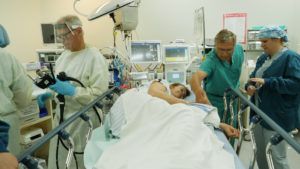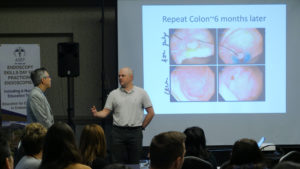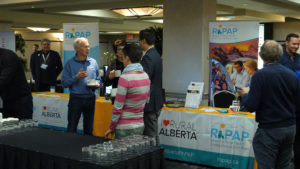Are people in rural Alberta receiving the same quality of colonoscopies as their counterparts in the cities?
In 2018, RhPAP contributed funding for a research study to find out.
The research study, looking at endoscopies (a broader range of procedures to examine the digestive tract than just colonoscopies), was headed by Dr. Michael Kolber, a professor with the PEER (Patients, Experience, Evidence, Research) Group in the Department of Family Medicine at the University of Alberta in Edmonton.
“We collected data on almost 2,000 colonoscopies and basically found that the Alberta family physicians that are performing colonoscopies are actually performing high quality procedures,” says Dr. Kolber.
In urban centres, colonoscopies are performed by gastroenterologists and general surgeons.
In rural areas, they are done by family physicians with enhanced training.
The research concluded that rural family physicians are meeting or exceeding all key colonoscopy quality benchmarks.
Dr. Leif-Erik Bredesen who practises in Camrose, Viking, and Daysland, was one of the nine study participants.
“We now have cold hard facts proving that, as a GP [General Practitioner], we can actually do quality endoscopy in a rural setting,” says Dr. Bredesen.

Dr. Hilgard Goosen is a family physician and colonoscopist in Ponoka, Alberta. He says now patients have the assurance that the colonoscopy they receive in a rural community like Whitecourt is the same quality as their relative in Toronto would get at a large hospital there.
This type of screening identifies polyps that can then be removed before they become cancerous.
Now people are talking about it in the coffee shop, they’re talking about it at Walmart, – about the polyps that were found. Their buddy avoided colon cancer. They’re going for their scope. – Dr. Ryan Torrie
Back in the early 2000s, screening rates for colon cancer in Taber, 260 km southeast of Calgary, were only about 20 per cent.
“There are a lot of elderly [people] and farmers,” explains Dr. Ryan Torrie, a rural family physician who performs colonoscopies in Taber. “They don’t want to drive to Calgary. They don’t want to drive to an urban centre far away. They’d rather not be screened.”
Ever since colonoscopies became available in Taber, screening rates have improved dramatically.
“We are at about 80 per cent [for] our colon cancer screening,” explains Dr. Torrie. “In our community in the past, [at] the thought of a colonoscopy, men would run. No one had a desire to do colon cancer screening. So, now people are talking about it in the coffee shop, they’re talking about it at Walmart, they’re talking about it on the street – about the polyps that were found. Their buddy avoided colon cancer. They’re going for their scope. So, it’s been phenomenal.”
Another advantage of rural colonoscopies is shorter wait times.
“If you needed to go to Calgary for a screening colonoscopy you would wait a year,” says Dr. Torrie. “Our waits – currently, if you need an urgent scope, I can do it next week. I’ll work it in. For routine stuff, we do it in the next one to two months.”
Providing colonoscopies in rural areas saves lives.
Dr. Torrie says that there used to be 11 to 15 cases of colon cancer every year in the Taber area. Today, the average is three.

Techniques and technology in colonoscopy are constantly advancing. It’s important for rural colonoscopists to keep up, so, RhPAP helps sponsor an annual endoscopy conference in Banff.
“The quality of the education is phenomenal,” says Dr. Torrie. “It’s only made possible with the support of organizations like RhPAP.”
“It’s not just listening to the expert, it’s the network,” adds Dr. Bredesen. “We’re talking to each other. ‘You’re doing that? Oh great. We should do that.’”

RhPAP also realizes it’s important for the whole team to receive training, so the organization also covers the majority of the registration cost for rural nurses to attend.
It made us more enthusiastic as a team to continue to grow and to learn more about endoscopies – Dawn Knodel, RN
Michelle Albrecht and Dawn Knodel are both registered nurses on Dr. Bredesen’s colonoscopy team in Daysland. They both attended the 2019 conference.
“We’re pretty passionate about endoscopy in Daysland,” says Albrecht. “We’ve embraced coming here [to the Endoscopy Conference] every year.”
“It made us more enthusiastic as a team to continue to grow and to learn more about endoscopies,” says Knodel. “Technology is changing and the knowledge of scopes is changing, so we are able to come here and stay abreast on all of that.”
Dr. Bredesen knows that the more knowledgeable his team is, the better the quality of the colonoscopies.
“Two eyes are good,” says Dr. Bredesen. “Four eyes are better. There are lots of times that they see things that I don’t see because it’s a big screen and you can’t see the whole screen all the time.”
For more information on upcoming Annual Endoscopy Skills Day for Practising Endoscopists and their Teams, visit asep.ca.
